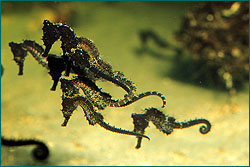 |
Seahorse Survival
 On its own, a baby seahorse has a lot to contend with. On average, if the
population is stable, only two of the thousands of young that a pair produces
will reach maturity. Life doesn't become much easier as an adult; the seahorse
must still avoid its natural predators, such as crab, tuna, skates, and rays.
Storms are probably the biggest natural cause of death for adult seahorses
because they tear seahorses from their holdfasts, to be cast ashore or die of
exhaustion.
On its own, a baby seahorse has a lot to contend with. On average, if the
population is stable, only two of the thousands of young that a pair produces
will reach maturity. Life doesn't become much easier as an adult; the seahorse
must still avoid its natural predators, such as crab, tuna, skates, and rays.
Storms are probably the biggest natural cause of death for adult seahorses
because they tear seahorses from their holdfasts, to be cast ashore or die of
exhaustion.
Place humans into the picture and the odds worsen. Because it is a
slow-swimming fish, the seahorse has to rely on camouflage to escape capture.
In addition, it is found in easy-to-reach coastal waters. It has few ways to
avoid being caught.
Seahorses are sought after for a variety of reasons:
- Chinese medicine
Chinese and other asian cultures have been using
seahorses in medicine for 400 to 500 years. The seahorse is believed to cure
impotency and asthma, lower cholesterol, and prevent arteriosclerosis. A
delicacy in cooking, the seahorse is also thought to enhance virility.
- Aquariums
Hobbyists are often enchanted by these peculiar-looking
fish, and buy them for home aquariums. However, seahorses are very difficult to
keep because they require live brine shrimp for food and are prone to disease
in a contained environment.
- Souvenirs
Dried seahorses are used to fashion keychains, jewelry,
paperweights, and other souvenirs.
In addition to direct human threats, the seahorse's habitat is also threatened.
Seahorses live in sea grass beds, mangroves, or coral reefs, which can be
destroyed through trawling, dredging, polluting, or even intense storms.
No one knows exactly how many seahorses there are in the world. Because of
this, and because of the high demand for the seahorse, conservationists are
working hard to ensure this magical fish has a future.
Photo © Rudie Kuiter
Seahorse Home | Crusader | Basics | Superdads
Roundup | Resources | Table of Contents
|